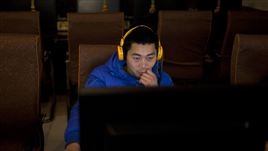From VOA Learning English, this is the Technology Report in Special English.
China has new rules that require people to use their real names when registering for Internet service. The rules also require Internet companies operating in China to remove material said to be objectionable.
Chinese lawmakers approved the measures on December 28th, at the end of a five-day meeting of the Standing Committee of the National People's Congress.

China Internet Controls
The new rules say network service providers must "strengthen management of information released by users." The providers have been ordered to stop the spread of illegal information after its discovery, and take steps to deal with the problem. The Xinhua news agency says those steps include removing the information from the Internet and then reporting it to the government.
Chinese officials say the rules are aimed at protecting the personal information of Internet users and stopping abuses such as junk e-mail. However, critics say real-name registration will make individuals less likely to report corruption and official abuses for fear of possible action against them.
Duncan Clark is an adviser to Stanford University's Graduate School of Business. He lives in Beijing. Mr. Clark says China seems to be seeking a balance between information control and government accountability.
"We've seen for a long time the Internet being used to expose corruption, but what's been interesting in the recent few weeks, which is maybe a sort of counter current to these new crackdowns on the Internet, is that a lot of this has been followed up."
Mr. Clark says reports of sexual or financial wrongdoing have led to the ouster of several government officials.
"We've seen a top down anti-corruption drive and so where previously we may have seen campaigns running for a couple of months, now we've seen within days, certain officials losing their posts and this is all driven by and fueled by the Internet. "
The new Internet regulations come at the same time as a Chinese government campaign against virtual private networks, or VPNs. Web users use VPNs to get around what has been called China's "Great Firewall." But some reports say the government is increasing its effort to block VPNs.













